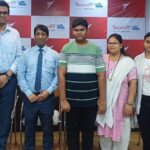“Hereditary Eye Diseases (HED) pose a significant health challenge in regions where consanguineous marriages, i.e., marriages between close relatives, and marriages within a closely linked community are more common. The risk of passing down genetic changes associated with HED may be higher in such cases.”
India
healthysoch
Hyderabad/New Delhi, April 10, 2024:
 Hereditary Eye Diseases (HED), as the name suggests, are genetic conditions inherited from parents to their children. These diseases affect various eye parts, including the retina, cornea, lens, and optic nerve. HED encompasses a range of eye conditions that can lead to poor vision, increased pressure in the eye, or difficulty seeing during the day or night. Some examples of HED include congenital corneal opacities, where children are born with corneal scars, congenital cataracts, congenital glaucoma, and retinitis pigmentosa. If left untreated, these conditions can impact an individual’s quality of life and even lead to blindness.
Hereditary Eye Diseases (HED), as the name suggests, are genetic conditions inherited from parents to their children. These diseases affect various eye parts, including the retina, cornea, lens, and optic nerve. HED encompasses a range of eye conditions that can lead to poor vision, increased pressure in the eye, or difficulty seeing during the day or night. Some examples of HED include congenital corneal opacities, where children are born with corneal scars, congenital cataracts, congenital glaucoma, and retinitis pigmentosa. If left untreated, these conditions can impact an individual’s quality of life and even lead to blindness.
Hereditary eye diseases (HED) can vary in severity and progression. Early detection, treatment, and guidance are crucial for managing these conditions and preserving vision. Genetic counselling may be advised for individuals with a family history of HED to assess their risk and make informed decisions about their eye health. Additionally, genetic counselling helps address concerns that parents often have regarding the risk of passing on the disease through future pregnancies. In regions where consanguineous marriages are common, the risk of passing down genetic defects associated with HED may be higher. This highlights the importance of raising awareness about HED and implementing early detection methods to mitigate lifelong consequences.
Facts about HED
An earlier population study done at L V Prasad Eye Institutes (Andhra Pradesh Eye Disease Study or APEDS) revealed some shocking facts about consanguinity and its effects on the eyes. The study found that the risk of certain eye diseases increased due to marriages between uncles and nieces or first cousins.
These findings highlight the need for greater awareness about the risks associated with consanguinity and the importance of genetic counselling for prospective parents. Families may attribute vision loss to other factors, overlooking the genetic component of the condition. Additionally, limited access to specialized eye care facilities exacerbates the problem, leading to delayed diagnosis and treatment.
Treatment and Management:
Some cases can be treated by standard surgical procedures, while others may not be corrected surgically. Low vision devices, lifestyle modifications, and supportive care may be required for these cases. That’s why it’s crucial to reduce the risk of these conditions through timely detection, genetic counselling, genetic testing, and breaking the cycle of propagation.
Dr Manjushree Bhate, Consultant Ophthalmology at L V Prasad Eye Institute’s Kallam Anji Reddy campus, Hyderabad, underscores the importance of this initiative, stating, “As a trusted eye care institution in the region, we understand the profound impact of hereditary eye diseases on individuals and families. By raising awareness and offering timely and tailored interventions for irreversible blinding conditions, including low-vision devices, vision rehabilitation, and other services, we aim to educate the society and help alleviate the burden of these ailments. Additionally, providing accurate genetic counselling can help us preserve our vision for future generations.”
healthysoch







